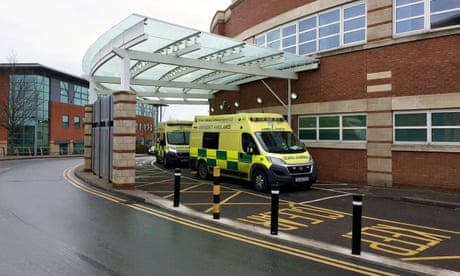Widespread concerns that the NHS will face the “toughest winter ever” are not exaggerated or unfounded – just look at the terrible news today from Worcestershire. We really should be worried for ourselves and our relatives. As a junior doctor and a researcher looking after cancer patients in the NHS, I am terrified by the prospect of what the next few months will bring. But we must not forget this is entirely preventable.

Three patients die at Worcestershire hospital amid NHS winter crisis
Our current crisis is down to the almost clockwork-like series of reshuffling, rebranding and top-down disorganisation of the services by government. It’s led to an inexorable decline in the quality of care.
I have also become aware of an insidious “takeover” by the private sector. It is both literal – in the provision of services – and ideological, with an overwhelming prevalence of business-speak being absorbed into our collective psyche. But the British public (and even many staff) remain largely unaware that this is happening.
Where the consultant physician or surgeon was once general, they now increasingly play second fiddle to chief executives and clinical business unit managers. Junior doctors such as myself (many of whom have spent 10-15 years practising medicine and have completed PhDs) must also fall in line to comply with business models and corporate strategy put forward by those with no clinical training or experience with patients.
It is this type of decision-making (based on little evidence) and seemingly unaccountable policymaking that means patient care is suffering. Blame cannot be laid at the feet of a population of demanding and ageing patients, nor the “health tourists” who are too often scapegoated.
The epitome of such changes is known as the “sustainability and transformation plans”. These will bring about some of the biggest shifts in how NHS frontline service are funded and run in recent history, and yet, worryingly, most of my own colleagues have not even heard of them. Even fewer feel able to influence them.
Sustainability and transformation plans will see almost a third of regions having an A&E closed or downgraded, and nearly half will see numbers of inpatient bed reductions. This is all part of the overarching five-year plan to drive through £22bn in efficiency savings in the NHS. But with overwhelming cuts in social services and community care and with GPs under immense pressure, people are forced to go to A&E because they quite simply do not have any other options.
I have been on the phone with patients with cancer who need to come into hospital with life-threatening conditions such as sepsis, and I have been forced to tell them, “We have no beds here you need to go to another local A&E.” Responses such as, “Please doctor don’t make me go there – last time there were people backed up down the corridors,” break my heart.
According to the Kings Fund, our NHS leaders are choosing to spend less year-on-year on healthcare (as a proportion of GDP) than at any other time in NHS history and yet we are the fifth richest economy in the world. Simultaneously private sector involvement increases and astronomical interest rates from private finance initiatives must be paid, with hospitals such as St Bartholomew’s in London having to pay up to £2m per week in interest alone. No wonder nearly all hospitals are now in dire straits.
This is all the result of intentional policies being made at the top with minimal consultation of those on the frontline. With such policies accumulating over the years we are now seeing the crisis come to a climax. The UK has fewer beds per person and fewer doctors per person than most countries in Europe. Fewer ambulances are now able to reach the highest-category emergencies, which means people having asthma attacks, heart attacks and traffic accidents are being left to wait longer in situations where minutes really matter.
The sustainability and transformation plans for my local area in south-west London show that they plan to cut 44% of inpatient bed stays over the next four years . This is dangerous. It is likely that St Helier hospital in Sutton, which takes many emergencies in the area, will close and patients will then not only have access to critically reduced services, they will then have to travel longer to hospital, having waited longer for the ambulance to get to them.
This will be the straw that broke the camel’s back. I cannot stand by while patients’ lives are put at unnecessary risk this winter. And neither should you.
This is all the result of intentional policies being made at the top with minimal consultation of those on the frontline. With such policies accumulating over the years we are now seeing the crisis come to a climax. The UK has fewer beds per person and fewer doctors per person than most countries in Europe. Fewer ambulances are now able to reach the highest-category emergencies, which means people having asthma attacks, heart attacks and traffic accidents are being left to wait longer in situations where minutes really matter.
The sustainability and transformation plans for my local area in south-west London show that they plan to cut 44% of inpatient bed stays over the next four years . This is dangerous. It is likely that St Helier hospital in Sutton, which takes many emergencies in the area, will close and patients will then not only have access to critically reduced services, they will then have to travel longer to hospital, having waited longer for the ambulance to get to them.
This will be the straw that broke the camel’s back. I cannot stand by while patients’ lives are put at unnecessary risk this winter. And neither should you.